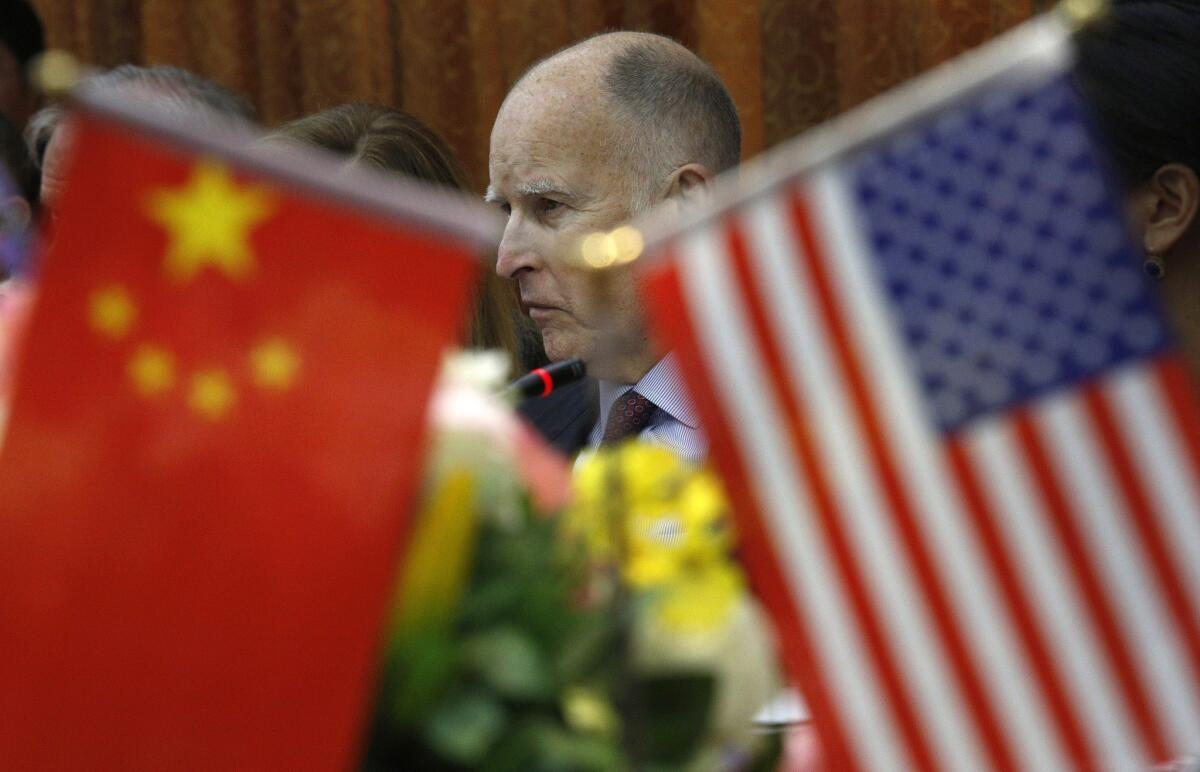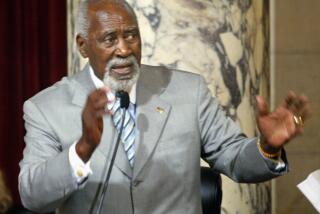Many private interests were Brown’s fellow travelers in China

- Share via
SACRAMENTO — As Gov. Jerry Brown returned this week from his trade mission to China, his decision to have his travel and that of 10 staffers paid for by special interests was raising eyebrows.
The dozens of delegates who joined Brown on the tour for $10,000 each — footing their bills and that of the governor’s entourage — included about 15 groups that lobby the state for favorable treatment on their agendas.
The California Hospital Assn., Kaiser Foundation Health Plan, the California Beer and Beverage Distributors and other interests sent along representatives — in one case a lobbyist — affording them face time with the governor during layovers, meals and receptions.
“I have lots of concerns about who is paying for the trip,” said Robert Stern, an open-government advocate who helped Brown write California’s main political ethics law in the 1970s. “Basically, it is special interests who want something from government.”
The companies and groups represented on the tour included the Wine Institute, Bank of America, Wells Fargo & Co., FedEx Corp., United Airlines, State Farm Insurance, HSBC, Siemens Corp., audit and consulting company Deloitte and housing development firms Five Point Communities and Lennar Urban.
Siemens, an engineering and electronics business, has expressed interest in working on California’s high-speed-rail project. The Wine Institute advocates on marketing issues. Banks want to fend off mortgage and finance laws they consider burdensome, and the beverage industry weighs in when lawmakers want to change rules on alcohol.
John Garcia, government relations director for Kaiser Foundation Health Plan, went to China too. Kaiser spent $5.9 million during the last two-year session of the Legislature lobbying the governor, state agencies and lawmakers on issues including healthcare funding. Insurers will be affected by the state’s implementation of the federal Affordable Care Act.
Also on the trip was lobbyist Lucie Gikovich, a former Brown administration official who is president of the Crane Group, whose clients include Kaiser Foundation Health Plan.
Kaiser isn’t looking to open hospitals in China or acquire Chinese financing, according to Kaiser spokesman Chris Stenrud. Its representatives wanted to participate in an exchange of ideas with Chinese officials and saw benefit in a mission with the potential to help California’s economy.
“Our success is inextricably linked to the economic success of our state,” Stenrud said in a statement, and in any case, the governor is accessible in California.
California Hospital Assn. President C. Duane Dauner is locked in a battle over a bill that would require nonprofit hospitals to provide a specific level of charity care. Dauner has called the bill “a manufactured political attack against nonprofit hospitals.”
If the measure, AB 975, passes the Legislature, it will land on Brown’s desk for his signature or veto.
The association also spends millions lobbying the governor and Legislature on such issues as hospital fees, cuts in the state healthcare budget and earthquake safety rules for hospitals.
Dauner joined the trip to participate in an exchange of ideas with Chinese officials at a time when a new national healthcare system in being implemented, said Jan Emerson-Shea, a vice president of the organization.
“Can we learn some things from the Chinese healthcare system at a time when we are going through major change? Yeah,” she said.
She discounted the idea that the trip represented a lobbying opportunity. “Duane already has conversations with the governor, with people in the administration, when he needs to,” Emerson-Shea said.
A representative of Kilpatrick, Townsend and Stockton, a law firm that last year lobbied in the Capitol for the Entertainment Software Assn., was in China too.
Brown said many of those accompanying him went to make deals and find investors. Delegates told him his presence would make it easier for them to do business in China, the governor said: “They say that because I met with the premier, that’s significant.”
The governor dismissed suggestions that people would go to China to lobby him.
“I am easy to get a hold of,” he told reporters last week as he traveled by bullet train from Beijing to Shanghai. “You don’t have to give to my art school or come on a train. I’m around.”
On their final evening together in China, Brown mingled and posed for photos with the 90 or so delegates in the 72nd-floor restaurant of the Ritz Carlton hotel in Guangzhou, where they munched on sashimi and grilled fish.
The delegates received commemorative license plates that read DREAMER and had been autographed by the governor and his wife, Anne Gust Brown, who was also on the trip.
Groups such as California Common Cause have been trying for years to get the state to outlaw the practice of having public officials’ travel covered by special interests.
“Lobbying entities are not in the business of throwing money away,” said Phillip Ung, a policy advocate for the good-government group. “They pay for these trips because they believe something is coming out of it that favors their interest.”
More to Read
Inside the business of entertainment
The Wide Shot brings you news, analysis and insights on everything from streaming wars to production — and what it all means for the future.
You may occasionally receive promotional content from the Los Angeles Times.











